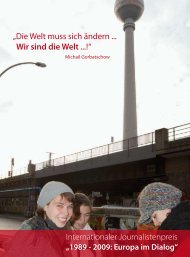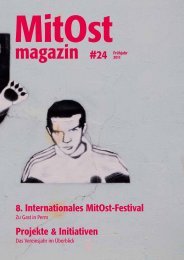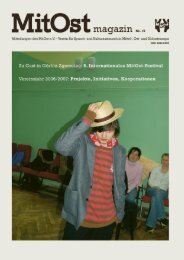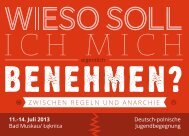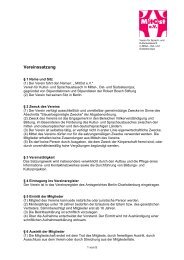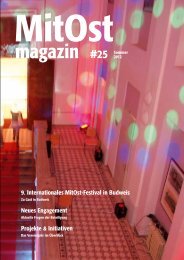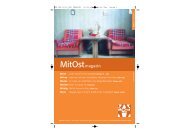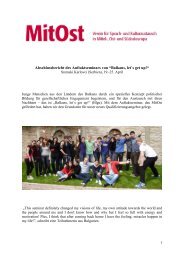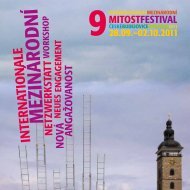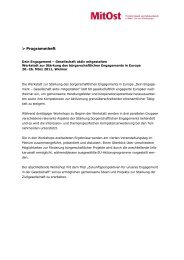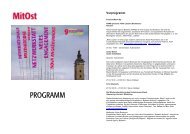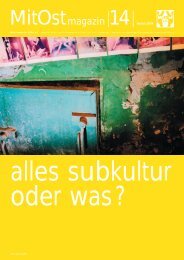Tandem-Shaml_Arab_Participants_Overview.pdf
Tandem-Shaml_Arab_Participants_Overview.pdf
Tandem-Shaml_Arab_Participants_Overview.pdf
Create successful ePaper yourself
Turn your PDF publications into a flip-book with our unique Google optimized e-Paper software.
Abbara participants to <strong>Tandem</strong> / <strong>Shaml</strong> Partnership Forum in Tunis 29 August – 2 September 2012<br />
List of <strong>Participants</strong><br />
1. B'chira Art Center – Tunis – Tunisia<br />
2. Rezodanse Center – Alexandria – Egypt<br />
3. Medrar for Contemporary Art – Cairo – Egypt<br />
4. 7assala Productions – Cairo – Egypt<br />
5. Ettijahat. Independent Culture – Damascus – Syria (or Lebanon or Jordan)<br />
6. Mobaderoun Institution for Development and Media – Port Saiid – Egypt<br />
7. Eltak3iba Center for Art and Development – Cairo – Egypt<br />
8. Iskenderella Association for Culture and Art – Alexandria – Egypt<br />
Short description of the participating organizations and cultural managers:<br />
Organization Art sector Fields of<br />
Interest<br />
About the host town Culture manager/ artist<br />
B'chira Art Center<br />
Contemporary Art installation Sabelet Ben Ammar, Tunis B’chira Triki Bouazizi<br />
Tunis – Tunisia<br />
Art<br />
A village situated 20 Km away from A distinguished Tunisian Artist that<br />
B’chira Art Center is a contemporary<br />
art center situated in Tunis, 20 km from<br />
Tunis the capital of both<br />
the Tunisian Republic and the Tunis<br />
organized a lot of individual and group<br />
shows in Tunisia and abroad. She was<br />
the capital in a village called Sabelet<br />
Governorate. It is Tunisia's largest present with her work in the Venice<br />
Ben Ammar. B’chira Art Center orga-<br />
city, with a population of 728,453 as Biennale of 2002. B’chira is founder and<br />
nizes mainly contemporary art exhi-<br />
of 2004; the greater metropolitan director of B’chira Art center created in<br />
bitions, workshops and film projections.<br />
area holds some 2,412,500 2011. B’chira Triki Bouazizi is very inte-<br />
inhabitants.<br />
rested in networking and especially in<br />
www.bchirartcenter.com<br />
collaborative programs with countries<br />
that are developed in contemporary art.<br />
Rezodanse Center<br />
Alexandria – Egypt<br />
Rézodanse is working on:<br />
• Providing a convenient space for<br />
local artists and young Alexandrians to<br />
learn, rehearse, practise and develop<br />
cultural projects in the field of the<br />
performing arts<br />
• Raising the standards in teaching<br />
dance in Alexandria, with a focus on<br />
ballet and modern dance<br />
• Supporting local artists by<br />
providing a workspace for their<br />
rehearsals and connecting them with<br />
our network<br />
• Organising specific workshops to<br />
introduce new techniques in the fields<br />
of dance and theatre<br />
• Supporting the development of<br />
Contemporary dance creation<br />
• Organising regular in-house<br />
cultural events<br />
• Organising festivals and street<br />
culture events<br />
http://rezodanseegypte.com<br />
Dance,<br />
performing arts<br />
Theatre, dance<br />
performance for<br />
children<br />
Alexandria<br />
The second-largest city of Egypt,<br />
with a population of 4.1 million,<br />
extending about 32 km (20 mi)<br />
along the coast of the Mediterranean<br />
Sea in the north central part<br />
of the country; it is also the largest<br />
city lying directly on the Mediterranean<br />
coast. It is Egypt's largest<br />
seaport, serving about 80% of<br />
Egypt's imports and exports.<br />
Alexandria is also an important<br />
tourist resort. It is home to the<br />
Bibliotheca Alexandrina.<br />
Alexandria was founded around a<br />
small pharaonic town c. 331 BC by<br />
Alexander the Great. It remained<br />
Egypt's capital for nearly a thousand<br />
years, until the Muslim conquest of<br />
Egypt in AD 641, when a new<br />
capital was founded at Fustat<br />
(Fustat was later absorbed into<br />
Cairo).<br />
Language: French/ <strong>Arab</strong>ic<br />
Hatem Hassan<br />
An Egyptian theatre director and culture<br />
projects manager. Following an extensive<br />
training in theatre and several workshops<br />
he took part in many projects in<br />
Egypt and abroad, including working in<br />
Avignon Festival in 2009 and 2010.<br />
Besides his career in theatre, Hatem<br />
shows many other talents as an artist,<br />
with several participations in different<br />
culture events as a coordinator, organizer<br />
or providing technical support. He<br />
continues to draw on that experience in<br />
his work as a culture activist.<br />
Languages: <strong>Arab</strong>ic/ English/ French
Organization Art sector Fields of<br />
Interest<br />
Medrar for Contemporary Art Contemporary Multimedia and<br />
Cairo – Egypt<br />
visual arts Multimedia<br />
Laboratories<br />
Medrar for Contemporary Art is a<br />
common cultural and philanthropic<br />
platform for young emerging artists<br />
based in Egypt. It aims to contribute to<br />
the motivation of different means of<br />
communication, developing experiences<br />
and financial support for contemporary<br />
praxis on the national, regional<br />
and international level.<br />
Medrar’s main objective is to drive the<br />
interest of young emerging artists and<br />
provide them with chances of<br />
experimentation and accession by<br />
encouraging their activities and the<br />
intercultural exchange between them<br />
globally, as well as creating a space for<br />
dialogue between young art critics by<br />
producing serial prospectuses and<br />
critique researches and providing<br />
database for curatorial based projects.<br />
www.medrar.org<br />
7assala Productions (Hassala)<br />
Cairo – Egypt<br />
In July 2010, Hassala production<br />
house was founded by a group of<br />
filmmakers and artists, who gathered<br />
after independently producing their first<br />
long fiction movie; it was the time<br />
starting pass experience and help<br />
other fellow independent filmmakers, to<br />
produce their projects; despite of<br />
economic, geographic factors, certain<br />
abstraction or orientations, and despite<br />
their lack of accesses to independent<br />
filmmaking scene, and networks.<br />
Our general goal is to contribute to the<br />
development of the independent filmmaking<br />
industry, to promote its market;<br />
besides, detect alternative ways and<br />
new forms of cinematic producing.<br />
Furthermore, we aim to support fresh/<br />
free filmmakers, in order to fight<br />
stereotypes on the Egyptian screens,<br />
and to stimulate knowledge exchange,<br />
that serves community’s benefits and<br />
protect it, from Platitudes, repetition<br />
and cultural stagnation.<br />
During the past two years, Hassala<br />
assisted some directors to fundraise<br />
and produce their long films.<br />
Filmmaking<br />
production,<br />
training and<br />
distribution<br />
Interactive media<br />
arts development<br />
Audiovisual data<br />
manipulation for<br />
artistic creation<br />
purposes<br />
Documenting<br />
(filming)<br />
development<br />
through art with<br />
children that<br />
have difficulties<br />
About the host town Culture manager/ artist<br />
Cairo<br />
The capital of Egypt and the largest<br />
city in the <strong>Arab</strong> world and Africa,<br />
and the 16th largest metropolitan<br />
area in the world. Located near the<br />
Nile Delta, it was founded in the<br />
year 969 A.D. making it 1,043 years<br />
old. Nicknamed "The City of a<br />
Thousand Minarets" for its preponderance<br />
of Islamic architecture,<br />
Cairo has long been a centre of the<br />
region's political and cultural life.<br />
Cairo was founded by the Fatimid<br />
dynasty in the 10th century AD.<br />
With a population of 6.76<br />
million spread over 453 square<br />
kilometers (175 sq mi), Cairo is by<br />
far the largest city in Egypt. With an<br />
additional ten million inhabitants just<br />
outside the city, Cairo resides at the<br />
centre of the largest metropolitan<br />
area in Africa and the eleventhlargest<br />
urban area in the world.<br />
Cairo<br />
The capital of Egypt and the largest<br />
city in the <strong>Arab</strong> world and Africa,<br />
and the 16th largest metropolitan<br />
area in the world. Located near the<br />
Nile Delta, it was founded in the<br />
year 969 A.D. making it 1,043 years<br />
old. Nicknamed "The City of a<br />
Thousand Minarets" for its preponderance<br />
of Islamic architecture, Cairo<br />
has long been a centre of the<br />
region's political and cultural life.<br />
Cairo was founded by the Fatimid<br />
dynasty in the 10th century AD.<br />
With a population of 6.76<br />
million spread over 453 square<br />
kilometers (175 sq mi), Cairo is by<br />
far the largest city in Egypt. With an<br />
additional ten million inhabitants just<br />
outside the city, Cairo resides at the<br />
centre of the largest metropolitan<br />
area in Africa and the eleventhlargest<br />
urban area in the world.<br />
Dia Hamed<br />
Born in Cairo, studied Art Education in<br />
“Helwan University”, lives and works in<br />
Cairo as an artist. Used to explore<br />
through wide variety of praxis like<br />
theater (performing, creation and scenography),<br />
and realizing creation of his<br />
projects within the Contemporary art<br />
scene of Cairo. Later on he took part<br />
with live performances in “Salon El<br />
Shabab” 17th & 18th as well as Sabeel<br />
performance meetings in the Townhouse<br />
gallery 2007/08, subsequently<br />
redirected to experimenting interactivity<br />
in public spaces with his latest projects<br />
“situation-complication” & “Native<br />
Tourists”. He co-founded Studio Moroni<br />
Theater Company, Sabeel project and<br />
Medrar for Contemporary Art, in which<br />
he’s currently working as a projects’<br />
director, and with Berlin-based Company<br />
“Rimini Protokol” for documentary<br />
theater production as assistant director.<br />
Languages: <strong>Arab</strong>ic/ English/ Spanish<br />
Donia Maher Abdalla<br />
33 years old Egyptian female, who<br />
studied fine arts in Egypt and Market<br />
management in USA through a Fulbright<br />
scholarship.<br />
Practiced many forms of expression<br />
such as acting, stop-motion animating,<br />
writing and digital arts; in addition to<br />
fundraising and workshops coordination.<br />
Played leading role in 7assla’s first<br />
production film by Hala Lotfy; published<br />
one collection of short stories and<br />
received a grant from Al Mawred Al<br />
Thaqafy and the British council to<br />
publish two under publishing books, an<br />
album and a novel. Co-wrote a grant<br />
wining movie script by Muhammed<br />
Rashad.<br />
Instructed and created art programs for<br />
teachers and children in Upper Egypt.<br />
“it was a wonderful experience to touch<br />
and follow changes that arts made in<br />
those beautiful little souls”<br />
Languages: <strong>Arab</strong>ic/ English
Organization Art sector Fields of<br />
Interest<br />
Ettijahat. Independent Culture Independent Play writing and<br />
Damascus – Syria (or Lebanon or culture in Syria. training for<br />
Jordan)<br />
Activation of<br />
young writers<br />
Ettijahat – Independent Culture is the basic Theater relation<br />
currently under construction. It is relation with<br />
preparing to start its projects and between contemporary<br />
programs within the coming few cultural and reality<br />
months (the most important ones of artistic action<br />
highest priority are):<br />
and Syrian<br />
society.<br />
Liqaa: literary events for young writers<br />
between 20-25 years old living in small<br />
cities and the Syrian countryside.<br />
These are individual events, each<br />
continues for three weeks in<br />
Damascus.<br />
Current needs and future<br />
developments of cultural research in<br />
Syria: the research project continues<br />
over 14 months and involves a<br />
research team formed of 8-10<br />
professional and young researchers.<br />
The professionals will train, guide and<br />
supervise the young in implementing<br />
the research project. The methodology<br />
is based on capacity building, directly<br />
(workshops and guiding sessions) and<br />
indirectly (supervising, guiding and<br />
assessing). The final product of the<br />
research group is a written research<br />
project covering “the current situation<br />
and future needs of cultural research in<br />
Syria”.<br />
www.ettijahat.org<br />
Culture policy<br />
development.<br />
About the host town Culture manager/ artist<br />
Damascus, Amman or Beirut Mudar El Hejji<br />
Born in 1981 in Idlib and graduated from<br />
the Higher Institute for Theatrical Arts in<br />
Damascus. Working in the Masar (Path)<br />
project, as a designer for interactive<br />
children projects and as trainer for<br />
executive teams that have presented<br />
these activities since 2005.<br />
Attended a workshop in 2005, for<br />
theatre writing under the supervision of<br />
the Scottish play writer David Craig.<br />
This workshop was like the launching<br />
pad for a street workshop for new<br />
theatrical writing that has come together<br />
and started in 2007. Texts for theatre<br />
that try to simulate daily reality of Syrian<br />
citizens on the theme “Damascus<br />
Today” were written. He wrote texts on<br />
“Don Juan, Wissal, Bronze, Satan”, of<br />
which Don Juan and Bronze were<br />
published.<br />
Prepared presentations (Enemy of the<br />
People - Nothing more), directed by<br />
Yasser Abdellatif in Damascus and<br />
Dramaturge (Waq3 el Khatta)<br />
presentation, on a text by Samuel<br />
Beckett in Damascus in 2011.<br />
Participated in 2010, in a program on<br />
theatrical writing in London, granted by<br />
the Delfina Foundation.<br />
Participated in a street workshop with<br />
writers on book publishing (Stories of<br />
Spirit and Cement) that involved four<br />
theatre texts on the city as its main<br />
subject and that also involved his text<br />
Bronze.<br />
Participated in 2011, in a theatre writing<br />
workshop in Alexandria as part of an<br />
<strong>Arab</strong> theatre meeting (Nobet Sohian),<br />
supervised by the Swiss writer Eric<br />
Eltrover.<br />
Languages: <strong>Arab</strong>ic/ English
Organization Art sector Fields<br />
Interest<br />
of<br />
Mobaderoon for cultural Cultural Documenting,<br />
development and media<br />
development reviving and<br />
Port Saiid – Egypt<br />
and activation presenting<br />
existing and<br />
Mobaderoon was established to adopt<br />
vanishing<br />
a youth initiative on the redefinition of<br />
aspects of life in<br />
the identity and character of the city of<br />
coastal<br />
Port Said in its modern history<br />
cosmopolitan<br />
throughout Egypt’s wars since the start<br />
cities “ports” and<br />
of commando operations against the<br />
their impact of<br />
occupation in the 1940s and 1950s<br />
these artistic,<br />
until the war of 1973. This will be<br />
social, economic<br />
achieved by helping the youth obtain<br />
etc trends on the<br />
skills in creative writing, photography<br />
cultural scene by<br />
and short films for cinema to register<br />
storytelling,<br />
the historic Port Said events and<br />
photography<br />
document them from their point of view<br />
exhibitions,<br />
by using these skills.<br />
As part of the “Infra Media” project that<br />
was implemented by the “Press Action”<br />
group, Mobaderoon offered training to<br />
civil society activists and young media<br />
workers in Alexandria in the field of<br />
developmental media, media monitorring<br />
and analyzing and promotion campaign<br />
and support winning.<br />
performances of<br />
folkloric art.<br />
Mobaderoon members participated in<br />
training civil society activists and media<br />
workers in Mansoura and Qenna in<br />
promoting impartiality, transparency<br />
and corruption fighting.<br />
Mobaderoon organizes a number of<br />
workshops on creative writing for<br />
creative youth on human rights issues.<br />
Mobaderoon sponsors radio transit, an<br />
internet radio seeking to make the<br />
voice of the youth heard and develop<br />
the active participation in society.<br />
Mobaderoon sponsors the “Fil Midan”<br />
band. It is an independent youth band<br />
that revives the Simsimiya of Port Said<br />
and links it to the events of the 25 th of<br />
January Revolution.<br />
About the host town Culture manager/ artist<br />
Port Saiid<br />
Lies in north east Egypt extending<br />
about 30 kilometres (19 mi) along<br />
the coast of the Mediterranean Sea,<br />
north of the Suez Canal, with an<br />
approximate population of 603,787<br />
(2010). The city was established in<br />
1859 during the building of the Suez<br />
Canal.<br />
Port Saiid’s economic base is<br />
fishing and industries, such as<br />
chemicals, processed food, and<br />
cigarettes. Port Saiid is also an<br />
important harbour for exports of<br />
Egyptian products like cotton<br />
and rice, but also a fuelling station<br />
for ships that pass through the Suez<br />
Canal.<br />
Badr Elebidy<br />
Mobaderoon’s manager since its<br />
initiation in addition to managing and<br />
developing various successful initiatives<br />
and experimental projects.<br />
Badr participated in the evaluation of the<br />
<strong>Arab</strong> Youth Initiatives in addition to<br />
participating in various workshops and<br />
cultural exchange programs such as<br />
“traditional buildings in Mediterranean<br />
cities” that took place in Greece in 2007,<br />
“Cultural exchange for youth from<br />
Mediterranean cities” that took place in<br />
Jordan in 2004.<br />
Organized various performances and<br />
festivals that took place within the Suez<br />
Canal region in addition to being in<br />
charge of the artistic activities within<br />
advocacy campaigns focusing on art<br />
and culture.<br />
Languages: <strong>Arab</strong>ic/ English (not very<br />
fluent)
Organization Art sector Fields of<br />
Interest<br />
Eltak3iba Center for Art and Artistic and Children<br />
Development<br />
cultural expression via<br />
Cairo – Egypt<br />
development art (drawing)<br />
Tak3iba has been working since 2007<br />
in the field of artistic and cultural<br />
development with a view to provide<br />
opportunities to new individuals that<br />
have not yet worked in arts and culture<br />
in the downtown area. In 2012, the<br />
Centre was established as a company<br />
with limited liability in Shobra El<br />
Khaima to work with children and<br />
youths on educational, cultural and<br />
artistic programs. The activities involve<br />
the ‘Publication for All’, the “Bil Masri<br />
Akoun”, the “Presentation Day” , and<br />
“The Book Exchange Day” festivals,<br />
and the “Yalla Poetry” meeting, the<br />
competition on “Egypt in one Shot” in<br />
addition to workshops on photography,<br />
handmade products, training for acting,<br />
writing comics and origami drawing.<br />
The Centre has formed a theatre group<br />
that adopts the interactive method and<br />
a number of theatre performances.<br />
Iskenderella Association for Culture<br />
and Art<br />
Alexandria – Egypt<br />
With its activities, Eskenderella<br />
Association aims to disseminate and<br />
support cultural rights and freedoms,<br />
obtain cultural justice by offering<br />
cultural services to sectors and regions<br />
that are culturally disadvantaged, to<br />
activate the role of art as a social<br />
driver, an archive for the collective<br />
memory and a guide for reform and<br />
enlightenment, through the inspiration<br />
of human and civilization values that<br />
were built in Alexandria and lived by.<br />
Most outstanding programs:<br />
The “Zorouni kol sanna marra” festival<br />
(2006 – 2012), an annual artistic and<br />
cultural street festival in the Kom El<br />
Dikka district celebrating the anniversary<br />
of Sayed Darwish in co-operation<br />
with Eskenderella, the residents, coffee<br />
shops, squares and young artists.<br />
The “Qalbi alboum” (My heart is an<br />
album) program: is concerned with the<br />
personal heritage of people, collecting<br />
old pictures and documents. Its activities<br />
include documentation, exhibittions,<br />
art work, seminars, publications<br />
and memorial products.<br />
Culture, art<br />
preservation,<br />
supporting<br />
popular and<br />
local cultures,<br />
cultural and<br />
societal<br />
development<br />
Underdeveloped<br />
neighborhoods<br />
Amateurs<br />
Community art<br />
Creative<br />
interaction and<br />
cultural search in<br />
the memory of<br />
coastal cities<br />
through<br />
personal<br />
memory of the<br />
original residents<br />
or foreigners,<br />
immigrants and<br />
expatriates by<br />
accounts,<br />
stories, pictures<br />
and personal<br />
documents<br />
About the host town Culture manager/ artist<br />
Cairo<br />
The capital of Egypt and the largest<br />
city in the <strong>Arab</strong> world and Africa,<br />
and the 16th largest metropolitan<br />
area in the world. Located near the<br />
Nile Delta, it was founded in the<br />
year 969 A.D. making it 1,043 years<br />
old. Nicknamed "The City of a<br />
Thousand Minarets" for its preponderance<br />
of Islamic architecture, Cairo<br />
has long been a centre of the<br />
region's political and cultural life.<br />
Cairo was founded by the Fatimid<br />
dynasty in the 10th century AD.<br />
With a population of 6.76<br />
million spread over 453 square<br />
kilometers (175 sq mi), Cairo is by<br />
far the largest city in Egypt. With an<br />
additional ten million inhabitants just<br />
outside the city, Cairo resides at the<br />
centre of the largest metropolitan<br />
area in Africa and the eleventhlargest<br />
urban area in the world.<br />
Alexandria<br />
The second-largest city of Egypt,<br />
with a population of 4.1 million,<br />
extending about 32 km (20 mi)<br />
along the coast of the Mediterranean<br />
Sea in the north central part<br />
of the country; it is also the largest<br />
city lying directly on the Mediterranean<br />
coast. It is Egypt's largest<br />
seaport, serving about 80% of<br />
Egypt's imports and exports.<br />
Alexandria is also an important<br />
tourist resort. It is home to the<br />
Bibliotheca Alexandrina.<br />
Alexandria was founded around a<br />
small pharaonic town c. 331 BC by<br />
Alexander the Great. It remained<br />
Egypt's capital for nearly a thousand<br />
years, until the Muslim conquest of<br />
Egypt in AD 641, when a new<br />
capital was founded at Fustat<br />
(Fustat was later absorbed into<br />
Cairo).<br />
Ahmed Hassen Mohamed<br />
B.A. in Literature, Hebrew language and<br />
literature, Ain Shams University<br />
B.A. in Critique and Drama, Ain Shams<br />
University<br />
Theatre director and actor and cultural<br />
activist<br />
Participated in many artistic and cultural<br />
workshops<br />
Directed more than one play for<br />
associations working in the field of<br />
children, women and human rights<br />
Participated in a workshop in cultural<br />
management<br />
Volunteers for the Egyptian Centre for<br />
Women’s rights – the Choir Project<br />
Languages: <strong>Arab</strong>ic/ understands English<br />
Hamdi Zedan Abdel Salam<br />
Poet, dramaturg, and cultural activist,<br />
founder of Eskenderella for Culture and<br />
Art, previously chairman and executive<br />
director and currently program director<br />
B.A. in Law for Alexandria University<br />
1994.<br />
Publications: “Judge the Murderers”<br />
translated into English “Everybody” a<br />
book with literary texts by seven authors<br />
from Alexandria. “The road is not<br />
narrow...it’s me who is too much”<br />
Egyptian vernacular poetry, “Wine of the<br />
evening...milk of the day”.<br />
Co-edited and written in “Khamasin” an<br />
independent literary magazine from<br />
1996-1999; “Ogarit” a literary cultural<br />
magazine publication in French and<br />
<strong>Arab</strong>ic issued in Paris, “Mina” magazine<br />
cultural literary magazine in English and<br />
<strong>Arab</strong>ic between New Orleans and<br />
Alexandria.<br />
Received different prizes: best theatre<br />
writer at the national theatre festival, and<br />
the Cairo festival prize for experimental<br />
theatre for best team work.<br />
Languages: <strong>Arab</strong>ic/ understands English



